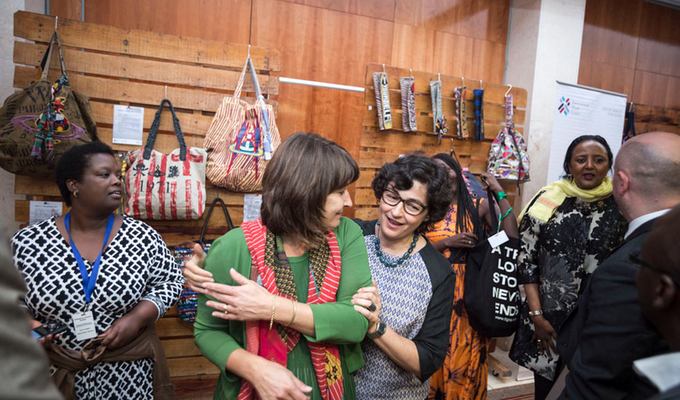



Beating poverty through fashion
Can fashion play a role in fuelling economic growth in developing countries? Yes, according to discussions at an event organized by the International Trade Centre (ITC), the African Development Bank (AfDB) and the Government of Germany on the sidelines of the Third International Conference on Financing for Development in Addis Ababa, Ethiopia, on 13 July.
The United Nations conference is tasked with setting out a framework for financing to achieve the UN’s post-2015 development agenda, the successor to the Millennium Development Goals.
Opening the side event, Kenyan Cabinet Secretary for Foreign Affairs Amina C. Mohamed said efforts such as ITC’s Ethical Fashion Initiative (EFI) demonstrate that fashion can indeed help lift people out of poverty. She drew particular attention to the EFI’s operation in Kenya, which was launched with seed money from official development assistance (ODA), evolved into a social enterprise, and has now opened up to private investments, paving the way for the exit of donor support.
‘ITC and its donors took a risk by launching this project to see if it worked,’ Mohamed said. ‘This deserves a lot credit in the first place, but it did work and investors are now getting a fair return on their investments.’
Lilianne Ploumen, the Dutch Minister for Foreign Trade and Development, pointed to the Dutch Good Growth Fund: Business for development, as another initiative that fashion designers in developing countries could take advantage of in their efforts to export.
‘The Growth Fund is available to small and medium-sized enterprises (SMEs) in developing countries, but can also be used by Dutch SMEs that want to invest in countries such as Ethiopia,’ she said. ‘However, they must all meet certain criteria: they need to create jobs; transfer knowledge and demonstrate that they can make profits.’
ITC Executive Director Arancha González said that it was important to move beyond the notion of charity to instead emphasize the creation of decent jobs. She argued that this shift in focus would be especially important for the prospective Sustainable Development Goals. ‘The Ethical Fashion Initiative fits perfectly with the post-2015 development agenda: it’s about women – who account for 50% of the population and need to be mobilized – it’s about SMEs, and it’s about trade,’ she said. ‘Above all [the EFI] is all about markets: we need to ensure that markets are properly harnessed and are enjoyed by everyone and not just by a few.’
Sam Mensah, Founder and CEO of KISUA, an Africa-based international clothing brand, said that Africa has the opportunity to offer the world top-notch fashion, above all because the continent’s fashion is beautiful.
Yet emerging fashion designers from Africa must overcome challenges to reach markets, he said: ‘First of all you have to produce quality. But you also have to tell the story of the brand as well as where the fabric comes from: a bag is much more than a bag.’
He also pointed to need for improved operational capacity, which is needed to meet delivery orders on time. ‘If African fashion manages to crack this, the industry has a fantastic future,’ he said.
That view was backed up by Geraldine Fraser-Moleketi, Special Envoy on Gender at the African Development Bank (AfDB), who added that women’s roles throughout the fashion value chain need to be highlighted. ‘Spinners have to become visible too,’ she said.
Dominik Ziller, Deputy Director-General at the German Ministry of Economic Cooperation and Development, emphasised the need to ensure that quality requirements and standards are met by producers. Germany had successfully brought this into the agenda of the Group of Seven leading industrialized nations, he said, ‘because this is what consumers want’.
Ziller also noted that social enterprises had their pitfalls, pointing to the blurry line distinguishing a social enterprise from one that benefits from low production costs.
Meanwhile, Patrick Kariuki, Director and Founder of Amalgamated Chama, a group of investors that recently acquired a 30% stake in the EFI's Nairobi business, said: ‘Let’s invest in areas where we have a social impact, we need to have an impact on our own citizens.’
The desire to have a social impact was one of the main reasons for investing in the EFI, he said, adding that ethical fashion can be profitable and scaled up. ‘But we also need other investors, come and join us,’ he urged. Explaining the company’s commitment to dedicating a share of earnings to skills training for workers, he said ‘2% of the revenues go into a trust, that directly benefits the artisans.’
The FFD side event also featured discussants who provided the audience with an inside view of the fashion value chain. Helen Hai, CEO of the Made in Africa Initiative, said: ‘There is nothing wrong with African workers, it is all about changing ways, and there is nothing wrong with African standards: we are producing to a high quality and exporting.’
Auret van Heerden, President and Founder of Equiception, a corporate social responsibility consultancy, said: ‘Let’s create a new kind of value chain, where artisans can express themselves, and ethical consumers appreciate this.’



